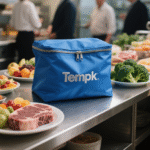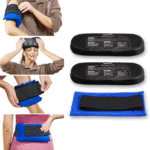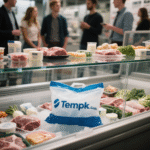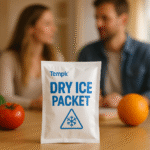Dry Ice Packs Amazon: 2025 Buyer & Versandhandbuch
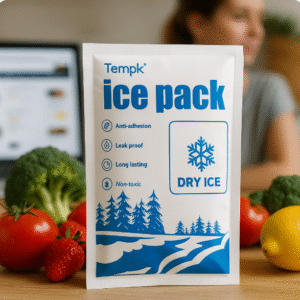
Table of contents
-
What “dry ice packs Amazon” really means
-
Fast chooser: pack type by job
-
Sizing math (24–72 h) you can trust
-
Step‑by‑step packout SOP (leak‑ and spike‑resistant)
-
2025 compliance essentials (IATA/USPS/UPS/FedEx)
-
Buying on Amazon Business (bulk, regions, reordering)
-
Entsorgung & sustainability notes
-
FAQs (straight to the point)
1) What “dry ice packs Amazon” really means
On Amazon, the term typically covers reusable gel sheets/blocks Und phase‑change material (PCM) bricks marketed as “dry‑ice‑like”—safe to store and ship without hazmat. Real dry ice is solid CO₂ (≈ −78.5 °C), regulated as UN1845 and handled differently. Use real dry ice only when you truly need deep‑frozen endurance or recovery from severe heat.
Consumer tests consistently show dense PCM or high‑mass gel packs outperform thin sheets for duration (notably brands like Cooler Shock, Arctic Ice, YETI). That matters when you’re expecting a day‑plus on the road.
2) Fast chooser: “dry ice packs Amazon” options by job
| Goal at delivery | Ambient & Zeit | Isolierung | Best choice | Warum |
|---|---|---|---|---|
| Refrigerated (2–8 ° C) Käse, meal kits | 20–30 °C · 24–48 h | Mailer + liner | Gel sheets + few hard packs | Broad surface coverage; einfach; non‑DG |
| Semi‑frozen proteins | 25–30 °C · 24–36 h | EPS ≥30 mm | PCM −8 °C (Z.B., slim bricks) | Longer, colder hold vs gel |
| Hard‑frozen steaks/gelato | 25–35 °C · 24–48 h | Cooler shipper | PCM −15 °C to −21 °C | “Dry‑ice‑like” without DG |
| Hard‑frozen 48–72 h+ or weak insulation | Hot route | Rigid cooler | Real dry ice (UN1845) | Deep‑frozen endurance; follow rules |
Pro tip: Pack tight (minimize headspace), layer around & above the payload, Und pre‑chill everything. These three moves beat “more packs” 9 out of 10 mal.
3) Sizing math you can actually use (start‑point heuristics)
-
Chilled (Gel): ~1 lb gel per ft³ of payload volume per 24 h; scale up in summer or thin walls.
-
Semi/Hard‑frozen (PCM −8/−15/−21 °C): start with panel mass ≈ 25–40% of payload mass for 24–36 h; add 20–30% in heat waves.
-
Dry ice for frozen: ~5–10 lb per 24 h depending on insulation and ambient; always vent.
These are industry heuristics to get your first successful run; validate with a test shipment on your worst lane, then lock an SOP.
4) Packout SOP (24–72 h) — copy/paste
-
Pre‑condition
-
Chill/freeze product to target.
-
Freeze PCM to its set point (Z.B., −15 °C) für 24–48 h; freeze gel bricks fully, flat.
-
Build the box
-
Use EPS 30–40 mm or a rigid cooler shipper + thermal liner.
-
Line bottom and sides with packs; keep headspace near zero (void fill helps).
-
Layer & seal
-
Put a “cold cap” on top (sheet or slab).
-
Moisture‑sensitive goods: bag gels or choose no‑sweat packs.
-
If using real dry ice
-
Use a entlüftet Container (never airtight).
-
Mark “Dry ice” or “Carbon dioxide, solid”, UN1845, Und net mass in kg; apply Klasse 9 diamond. (FedEx font‑height: ≥6 mm (≤30 kg) oder ≥12 mm (>30 kg).)
5) 2025 compliance essentials (don’t get flagged)
-
Iata (Luft): 2025 DGR 66th edition is in force; use the latest Dry Ice Acceptance Checklist for non‑DG cargo with dry ice (PI 954 context). Ensure marks/labels and net kg are present; overpacks must repeat marks or show totals.
-
USPS (domestic air): ≤5 lb dry ice per mailpiece; must permit CO₂ venting, follow Pub 52, PI 9A. International mail with dry ice is generally prohibited.
-
UPS (U.S. domestic air, non‑haz cargo): you may mark the amount oder use the statement “2.5 kg or less” in lieu of the exact amount (where applicable).
-
FedEx: maintain proper UN1845 marks and Klasse 9 Etikett; minimum character heights apply (6 mm ≤30 kg; 12 mm >30 kg). Don’t write inside the diamond.
6) Buying “dry ice packs Amazon” the smart way (B2B)
-
Amazon Business: set multi‑user approvals, tax settings, and bulk pricing; create saved lists by lane (Z.B., “Frozen 36 h −15 °C kit”).
-
Regional sourcing: order from the marketplace in the destination region (Z.B., EU) to cut lead time and customs friction.
-
QA checklist: prefer BPA‑free/food‑contact statements, mass per pack (heavier = longer), freeze instructions, Und reviews with timed tests (not vibes).
Independent tests in 2024–2025 frequently rate Cooler Shock Und Arctic Ice for long holds, mit YETI praised for durability—use this as a sanity check against look‑alikes.
7) Entsorgung & Nachhaltigkeit
-
Gel/PCM:trash unless the brand explicitly says drain‑safe or recyclable film; avoid sinks unless labeled (some products like “Drain Safe/Enviro” variants exist—follow maker guidance).
-
Return loops:verwenden reusables for facility‑to‑facility runs; disposables for one‑way D2C. A mixed model often cuts waste and total cost.
8) FAQs
Q1: Are “dry ice packs Amazon” the same as real dry ice?
NEIN. They’re gel/PCM packs that replace dry ice for many lanes without hazmat steps. Real dry ice is UN1845 and must be vented and labeled.
Q2: How many packs do I need for 24–48 h?
Chilled: ~1 lb gel/ft³ per 24 h. Semi/Hard‑frozen: PCM mass ≈ 25–40% of payload for ~24–36 h. For longer/far hotter routes, add mass or switch to real dry ice.
Q3: Can I ship dry ice with USPS/UPS/FedEx without paperwork?
USPS caps Luft at ≤5 lb and has specific marking rules. UPS (domestic air, non‑haz) accepts a “2.5 kg or less” statement on the box. FedEx enforces UN1845 + Klasse 9 with font‑height minimums. Always verify your service level and lane.
Q4: Which pack type lasts the longest?
Within non‑DG options, dense PCM (−8/−15/−21 °C) generally beats thin gels for duration; consumer tests back this up. Real Trockeneis still wins for deep‑frozen endurance.
















